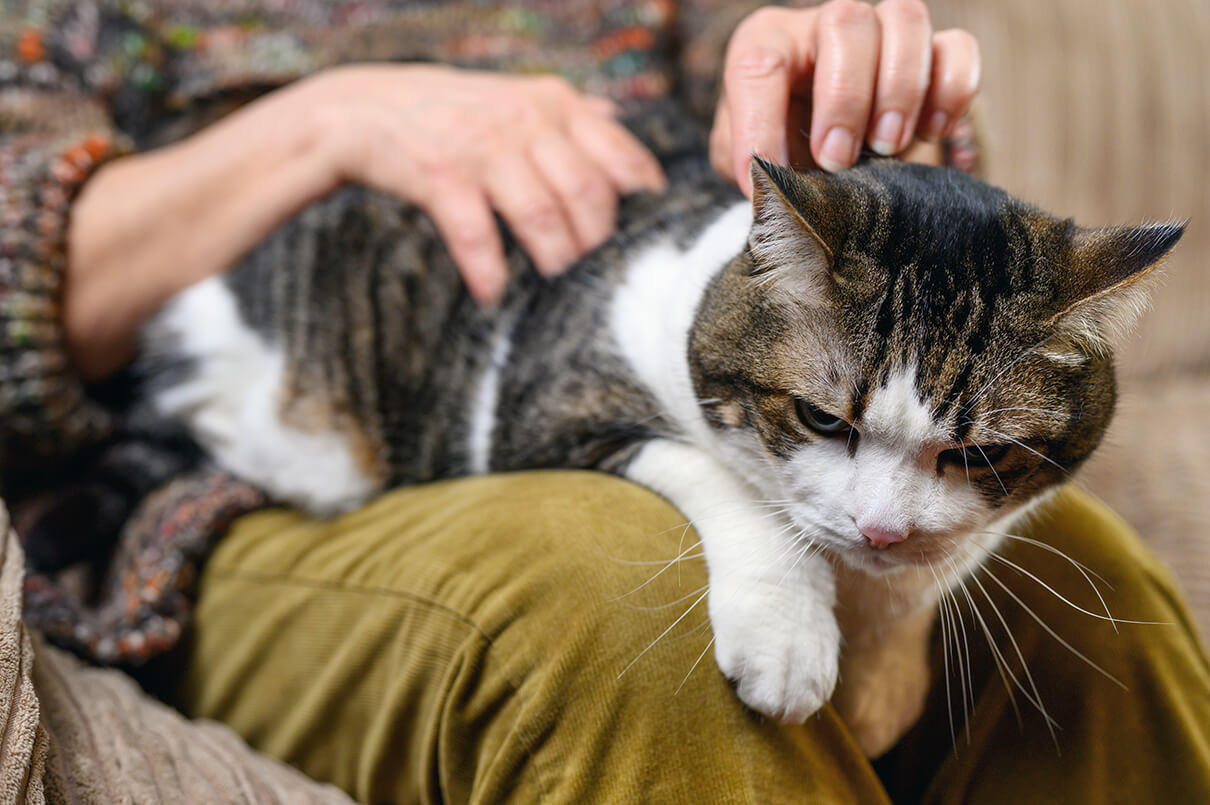
- by Dr.Thilo Senst
Can Stress Cause Skin Issues in Cats? Managing Itching
- by Dr.Thilo Senst
Can Stress Cause Skin Issues in Cats? Managing Itching
Cats, like humans, can experience stress for a variety of reasons, and this stress can manifest in different physical symptoms. One of the most common ways stress affects felines is through cat skin issues, particularly itching, hair loss, and inflammation. But can stress alone truly cause these skin issues, or is it an underlying factor that exacerbates existing conditions?
This article delves into how stress impacts your cat’s skin health, why it's essential to manage both the emotional and physical triggers, and how you can help your cat feel more comfortable with home remedies, supplements, and lifestyle adjustments. We’ll also look at effective products from the Dr. Senst Pets range that support feline skin health.
When a cat experiences stress, their body releases hormones like cortisol and adrenaline, which can disrupt their immune response. This stress-induced disruption often leads to inflammatory reactions, making the skin more susceptible to infections and allergens.
Stress can weaken the skin's natural barrier, making it easier for allergens, bacteria, and fungi to affect the skin. Common cat skin issues linked to stress include:
In these cases, the skin issues themselves are a physical manifestation of the emotional stress the cat is experiencing. This often becomes a cyclical problem—cats scratch due to itching, the skin gets inflamed, and the scratching continues.
Understanding the root cause of your cat’s stress is the first step in managing their cat skin issues. Common causes include:
Changes such as moving house, introducing new pets, or even altering the household routine can trigger stress in cats.
Indoor cats, especially those without enough mental and physical stimulation, may experience stress from lack of activity, leading to over-grooming or self-soothing through scratching.
Stress may also occur due to underlying health conditions like allergies, parasites, or infections. Cats can sense discomfort, and the physical stress from these conditions can escalate into emotional stress, exacerbating skin problems.
Dermatitis in cats is often linked to allergies or irritants, but stress can also play a role in making the skin more sensitive to these triggers.
When cats are stressed, they may over-groom, leading to psychogenic alopecia, a condition where hair falls out due to excessive licking.
Weak immune systems due to stress can make cats more prone to infections like ringworm, which results in scaly patches and further irritation.
Reducing your cat's stress is crucial in managing both their emotional and physical health. Some methods include:
Providing a balanced diet rich in omega-3 fatty acids can improve skin health and reduce inflammation. Supplements like Dr. Senst Itchy Cats Spray offer targeted relief for irritated skin.
Grooming helps reduce hair loss due to over-grooming and removes allergens that may be irritating your cat's skin. Grooming also provides an opportunity for you to monitor your cat’s skin for any early signs of problems.
The immune system is the body's natural defence mechanism, and stress can impair its function, leaving your cat vulnerable to skin infections. Managing stress through proper nutrition and natural supplements can help fortify the immune system, reducing the likelihood of cat skin issues.
According to a study published by the Veterinary Dermatology Journal, omega-3 fatty acids have been shown to reduce inflammation and promote healthy skin and coat in cats. Including these fatty acids in your cat's diet can reduce the impact of stress on their skin health.
Cats that feel less stressed are less likely to engage in excessive scratching, licking, or biting at their skin.
Managing stress leads to a healthier immune system, reducing the likelihood of skin infections or irritation and promoting a shinier coat.
Helping your cat manage their anxiety and related skin issues strengthens your relationship, as they trust you to provide comfort and care.
Yes, chronic stress can lead to ongoing skin problems such as dermatitis or hair loss if not treated. Managing both the stress and the skin symptoms early is essential for long-term health.
If your cat’s skin problems coincide with significant changes in their environment or routine, stress could be the trigger. Additionally, if veterinary tests rule out allergies or infections, stress may be the underlying cause.
Natural calming supplements like Dr. Senst Cat Calming Hemp Oil are effective in reducing stress and helping to manage skin health. Omega-3 supplements also support overall skin condition.
Provide distraction through toys or climbing posts, introduce calming supplements, and consider a vet check-up to rule out any underlying medical causes.
At the end of the day, addressing both stress and cat skin issues requires a holistic approach. Here are some recommended products to help:
Stress can indeed cause or exacerbate cat skin issues, leading to a range of symptoms from itching to hair loss and infection. By managing your cat's stress through a combination of dietary adjustments, environmental enrichment, and natural supplements like Dr. Senst Cat Calming Hemp Oil, you can help your feline friend live a happier, healthier life. Reducing stress not only benefits your cat’s skin but also improves their overall well-being and strengthens the bond between pet and owner.
![]()
Enter your details & download our comprehensive 50+ page printable Dr. Senst Pet Care Planner completley FREE! - keep track of all your pet’s needs, from medical history and training to vet visits, grooming, diet, and more!










Share:
How to Manage Separation Anxiety in Dogs: A Complete Guide
Swollen Cat Ears: Causes and Treatment Options